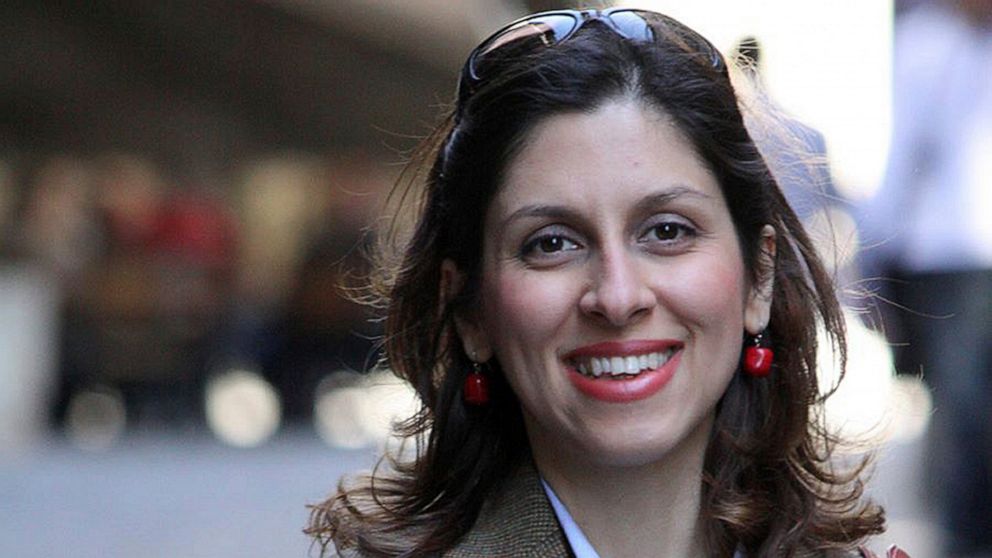US denies Iran’s claims of prisoner, cash swap; UK downplays
DUBAI, United Arab Emirates — The United States on Sunday immediately denied a report by Iran‘s state-run television broadcaster that deals had been reached between the Islamic Republic, Washington and the United Kingdom that would see prisoners swapped and Tehran receive billions of dollars.
The announcement by state television, relying on an unnamed source, comes amid a wider power struggle between hard-liners and the relatively moderate government of Iranian President Hassan Rouhani. That conflict only has grown sharper as Iran approaches its June 18 presidential election.
The broadcaster long controlled by hard-liners has aired similarly anonymously sourced reports contradicting diplomats in Vienna trying to negotiate a return to its nuclear deal with world powers.
It wasn’t immediately clear if Sunday’s report represented another means to disrupt negotiations by Rouhani officials or sabotage any potential negotiations with the West over frozen funds and prisoner exchanges.
The official quoted by Iranian state TV said a deal made between the U.S. and Tehran involved a prisoner swap in exchange for the release of $7 billion in frozen Iranian funds.
“The Americans accepted to pay $7 billion and swap four Iranians who were active in bypassing sanctions for four American spies who have served part of their sentences,” state TV said, quoting the official in an on-screen crawl. It did not name the Iranians that Tehran sought to be freed.
U.S. State Department spokesman Ned Price immediately denied the Iranian state TV report.
“Reports that a prisoner swap deal has been reached are not true,” Price said. “As we have said, we always raise the cases of Americans detained or missing in Iran. We will not stop until we are able to reunite them with their families.”
Price did not elaborate. But Biden’s chief of staff Ron Klain told CBS’ “Face the Nation” that “unfortunately that report is untrue. There is no agreement to release these four Americans.”
“We’re working very hard to get them released,” Klain said. “We raise this with Iran and our interlocutors all the time but so far there’s no agreement.”
Tehran holds four known Americans now in prison. They include Baquer and Siamak Namazi, environmentalist Morad Tahbaz and Iranian-American businessman Emad Shargi.
State TV also quoted the official as saying a deal had been reached for the United Kingdom to pay 400 million pounds to see the release of British-Iranian woman Nazanin Zaghari-Ratcliffe.
British officials downplayed the report. The Foreign Office said that the country continues “to explore options to resolve this 40-year old case and we will not comment further as legal discussions are ongoing.’’
Last week, Zaghari-Ratcliffe was sentenced to an additional year in prison, her lawyer said, on charges of spreading “propaganda against the system” for participating in a protest in front of the Iranian Embassy in London in 2009.
That came after she completed a five-year prison sentence in the Islamic Republic after being convicted of plotting the overthrow of Iran’s government, a charge that she, her supporters and rights groups deny.
While employed at the Thomson Reuters Foundation, the charitable arm of the news agency, she was taken into custody at the Tehran airport in April 2016 as she was returning home to Britain after visiting family.
Richard Ratcliffe, the husband of Zaghari-Ratcliffe, told The Associated Press he was not aware of any swap in the works.
“We haven’t heard anything,” he said. “Of course we probably wouldn’t, but my instinct is to be skeptical at present.”
Earlier Sunday, U.K. Foreign Secretary Dominic Raab told the BBC that he believed Zaghari-Ratcliffe was being held “unlawfully” by Iran.
“I think she’s been treated in the most abusive, tortuous way,” Raab said. “I think it amounts to torture the way she’s been treated and there is a very clear, unequivocal obligation on the Iranians to release her and all of those who are being held as leverage immediately and without condition.”
Last week, Cabinet spokesman Ali Rabiei hinted that a prisoner swap between Iran and the U.S. may be in the works, saying the idea “has always been on the agenda” and noting the judiciary has confirmed its “readiness.” His remarks followed that of the Foreign Ministry spokesman who suggested Tehran hopes to swing a major prisoner swap as part of ongoing negotiations in Vienna. A similar swap accompanied the 2015 nuclear deal with world powers
Tehran is now negotiating with world powers over both it and the U.S. returning to its 2015 nuclear deal, which saw it limit its uranium enrichment in exchange for the lifting of economic sanctions.
As the negotiations continue, Iranian negotiators there have offered encouraging comments, while state TV quoted anonymous sources striking maximalist positions. That even saw Abbas Araghchi, the Iranian deputy foreign minister leading the talks, offer a rebuke on Twitter last week to Iranian state television’s English-language arm, Press TV.
“I don’t know who the ‘informed source’ of Press TV in Vienna is, but s/he is certainly not ‘informed,’” Araghchi wrote.
———
Associated Press writers Amir Vahdat in Tehran, Iran; Danika Kirka in London and Matthew Lee in Washington contributed to this report.
![]()


